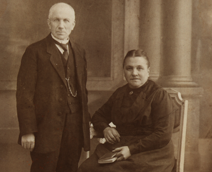[If you really enjoyed “The Shack” you may want to skip this.]
I don’t believe that any of the millions of readers of “The Shack” ever really believed that God, if he appeared to them in the flesh, would take on the appearance of a mighty old man with a beard and thunderbolts and a stern visage. But they believe that’s what other Christians think, and what non-Christians think they think, and therein is the essential appeal of the book: this is so wise! God is an obese, middle-aged, singing and chortling black woman baking in the kitchen, just loving you to death, and smiling indulgently at all those misperceptions you can then pretend to be enlightened of.
“Mack” even claims to be surprised that Jesus isn’t handsome, or Caucasian. He’s “surprised” that God doesn’t enjoy punishing bad people and casting them into a pit of fire. The fact that not a single one of those misperceptions is really upsetting to a conventional, conformist view of Christianity is beside the point. It just feels wise. It feels deep. They remind you of those tedious youth ministers some churches hire specifically to minister to young people, who wear jeans and listen to DC Talk to show that they’re hip, and admit that they sometimes feel tempted to, gosh, darn it, curse right out loud. These revelations will not, as the cover claims, “astonish” you. If you like the book, they will simply confirm what you already believe, and make you feel smarter about it. The same way Morgan Freeman makes you feel like you’re not a racist.
Making God a middle-aged black woman is actually as predictable as the old man with the beard and the staff. What would have been fresh is making God a door-to-door salesman, or a Puerto Rican bathroom attendant, or Jerry Falwell.
“The Shack” is fiction, in more ways than one. Mackenzie Phillips’ youngest daughter, Missy, is abducted and murdered while “Mack” is in the water rescuing his son from an overturned canoe. The police, who behave like New Age saints in this story (always tenderly sensitive to Mack’s feelings), can’t find Missy, but they do find a small wooden shack with her dress and blood on the floor. Later, a bitter Mack receives a note from God to come to the shack. Is it a hoax? Or will his experiences there “change his life forever”?
Yes, that does sound a bit cheesy. It is a necessary convention that Mack is reluctant to go to the shack. It is also necessary, for the conceit of this book, that Mac was not just sitting on a dock fishing, or checking out girls at the beach, or washing dishes when Missy is abducted. Or that the police never seem to hold any suspicions at all about Mack, even when he knows something that only the murderer would know. Unless you believe in miracles. Do all cops believe in miracles?
There is an explanation (but it’s a spoiler) about why the three beings sound so much like youth pastors– and it is an artistic weakness of the book that all three sound alike– but it doesn’t explain or illuminate why Mack would ever be surprised at the revelations. I mean, it would have been fun if he had found a clever way to allude to some aspect of his own personality but… well, that’s asking a lot.
I am reminded, whenever Young tries to describe a scene of overwhelming magnificence, of Mark Twain’s observation that most people would describe heaven as consisting largely of the same activities that bore them to tears in real life: singing and harp playing and floating around in gossamer chaste ecstasy. When Young describes a host of children, and Mack’s father, emanating light and song and colour– it sounds a lot to me like that kind of weird picture of the afterlife.
There’s nothing particularly awful about Young’s book. There’s just nothing particularly amazing about it either. Why is this so popular?
I’m not sure that a real victim of violent crime would find “The Shack” all that comforting. Or enlightening.
This is to music what “The Shack” is to film:
An alternative example of theological inspiration.
My comments on another contrived excursion into “authentic” faith: Donald Miller’s “Blue Like Jazz”.
My apologies for my views on “The Shack”. This is an incredibly popular book and people I love and respect do like it and claim that it has healing properties. I still like and respect those people but I also believe “The Shack” is really not as great as they think it is.
I would feel poorly served if I read a favorable review about some book or record or film and then found out the reviewer was kind to it because people he knew liked it.
The heart of this book is a relatively mundane writer speaking for God, trying to teach the reader theology by expressing it–stiffly– as dialogue between “Mack” and the Trinity, represented as a three persons living together in a shack.
That’s all. Since a real human can’t really even begin to explain, adequately, a real God, it all sounds more like a youth pastor to me than real characters. I’m not saying it couldn’t be done– a far more talented writer could do something with the idea, but that would require more poetry than William P. Young is capable of. A lot of it sounds like the villain carefully explaining all his nefarious plots to the hero who is tied to a chair and about to escape. After the explanation, of course.
I also find it really amusing that some conservative commentators, including Chuck Colson, don’t like “The Shack” and accuse the author of heresy. Wow. You would think there was something genuinely provocative in this book. Well, maybe there is. Young seems to take a fairly liberal approach to the idea of Hell, but then, so does Hollywood. He also suggests that all people, of all religions, are children of God– though it’s not very clear what the implications of that thought are, to him.
“The Shack” is essentially an attempt to explain the existence of evil in a world created and ruled by God. Is God just? It’s an old problem and I’m not particularly impressed by Young’s crack at it.
In a nutshell: “The consequences of selfishness are part of the processes that bring us to the end of our delusions, and helps us find you (God). Is that why you don’t stop every evil?” God replies, “All evil flows from independence and independence is your choice.”
No, it’s not. Either we’re independent or we aren’t. If we are independent, it’s because God planned the world that way. We didn’t choose to sign on to this arrangement. And we didn’t willingly bargain the sufferings of children for independence (see below).
And of course, if we are independent, God cannot be omnipotent. If he is omnipotent, he can stop the Nazis, the Stalins, the bombs, the land-minds, and James Dobson. If he can than he must, or God cannot be good. [It would take a book to elaborate why exactly.]
There’s just not much of anything in Young’s rather lengthy and dry explanations. In fact, the more “God” goes on about how wonderful the entire scheme is, even if a few children have to suffer and die, the more unconvincing he is. And this makes it doubly insufferable when Mack professes such astonishment at the “wisdom” he puts into God’s mouth. He sounds like a bad TV ad: and you mean I get all this for only $19.95— why that sounds too good to be true. “It does– but wait– there’s more…”
From the time I was in high school, I have heard this argument and I’ve never accepted it.
Dostoevsky’s twist on the idea was this: what if I refuse the bargain? What if I say, you can keep your “independence” or freedom. I refuse any deal that assumes, as a precondition, the suffering of innocent children. I refuse my ticket. God’s reply, in “The Grand Inquisitor” is that Jesus, because he was innocent, had a right to accept the bargain.
The flaw in Dostoevsky’s argument is that this does’t change the objection: it doesn’t matter if Jesus accepts the bargain: Jesus is not me. I still do not.
February 12, 2009
A lot of “The Shack” consists of a very orthodox Christian theology rendered in insipid dialogue, with the distressing frequency of self-satisfied chuckles or laughter from the three persons representing God, Jesus, and the Holy Spirit. What is the purpose of “Jesus chuckled in the dark. ‘Since I am human, we have much in common…’ ” Does theology presented with chuckling seem more folksy and down-to-earth, and not at all some pie-in-sky abstraction?
Good and evil? Simple. Humans should never rely on their own judgment– God is truth. Why didn’t I think of that? Maybe because the real problem is that humans tend to spend a lot of time and energy telling us that they know what God thinks and it happens to coincide with their own personal beliefs. The real problem which “The Shack” neatly sidesteps, is how do you know what the will of God really is? Isn’t there always some interpretation going on? How do you know it’s even God’s voice you hear when you claim He is telling you, clearly, to do this or that?
Is it supposed to be delightful to think that God might want to lie on a dock at night and look at his own stars? It would have been more amusing if he would have a special fondness for “Grey’s Anatomy” or “Friends”, or fresh cut fries. I checked to see if Young’s God is a vegetarian. Don’t know.
We do know, thanks to Young, that God likes Bruce Cockburn’s “Lord of the Starfields”. Well, that beats “Just as I Am”, I guess.
Alternatives: without question, the most accomplished version of this approach to theodicy is “The Grand Inquisitor” from “The Brothers Karamazov by Fydor Dostoevsky. If you have never read the whole book, you should– it’s one of the two or three greatest novels ever written.
[If you really enjoyed “The Shack” you may want to skip this.]
I don’t believe that any of the millions of readers of “The Shack” ever really believed that God, if he appeared to them in the flesh, would take on the appearance of a mighty old man with a beard and thunderbolts and a stern visage. But they believe that’s what other Christians think, and what non-Christians think they think, and therein is the essential appeal of the book: this is so wise! God is an obese, middle-aged, singing and chortling black woman baking in the kitchen, just loving you to death, and smiling indulgently at all those misperceptions you can then pretend to be enlightened of. “Mack” even claims to be surprised that Jesus isn’t handsome, or Caucasian. He’s “surprised” that God doesn’t enjoy punishing bad people and casting them into a pit of fire. The fact that not a single one of those misperceptions is really upsetting to a conventional, conformist view of Christianity is beside the point. It just feels wise. It feels deep. They remind you of those tedious youth ministers some churches hire specifically to minister to young people, who wear jeans and listen to DC Talk to show that they’re hip, and admit that they sometimes feel tempted to, gosh, darn it, curse right out loud. These revelations will not, as the cover claims, “astonish” you. If you like the book, they will simply confirm what you already believe, and make you feel smarter about it. The same way Morgan Freeman makes you feel like you’re not a racist.
“The Shack” is fiction, in more ways than one. Mackenzie Phillips’ youngest daughter, Missy, is abducted and murdered while “Mack” is in the water rescuing his son from an overturned canoe. The police, who behave like New Age saints in this story (always tenderly sensitive to Mack’s feelings), can’t find Missy, but they do find a small wooden shack with her dress and blood on the floor. Later, a bitter Mack receives a note from God to come to the shack. Is it a hoax? Or will his experiences there “change his life forever”?
Yes, that does sound a bit cheesy. It is a necessary convention that Mack is reluctant to go to the shack. It is also necessary, for the conceit of this book, that Mac was not just sitting on a dock fishing, or checking out girls at the beach, or washing dishes when Missy is abducted. Or that the police never seem to hold any suspicions at all about Mack, even when he knows something that only the murderer would know. Unless you believe in miracles. Do all cops believe in miracles?
There is an explanation (but it’s a spoiler) about why the three beings sound so much like youth pastors– and it is an artistic weakness of the book that all three sound alike– but it doesn’t explain or illuminate why Mack would ever be surprised at the revelations. I mean, it would have been fun if he had found a clever way to allude to some aspect of his own personality but… well, that’s asking a lot.
I am reminded, whenever Young tries to describe a scene of overwhelming magnificence, of Mark Twain’s observation that most people would describe heaven as consisting largely of the same activities that bore them to tears in real life: singing and harp playing and floating around in gossamer chaste ecstasy. When Young describes a host of children, and Mack’s father, emanating light and song and colour– it sounds a lot to me like that kind of weird picture of the afterlife.
There’s nothing particularly awful about Young’s book. There’s just nothing particularly amazing about it either. Why is this so popular?
I’m not sure that a real victim of violent crime would find “The Shack” all that comforting. Or enlightening.
Here’s an alternative example of theological inspiration.
All Contents Copyright © Bill Van Dyk
2009 All Rights Reserved



